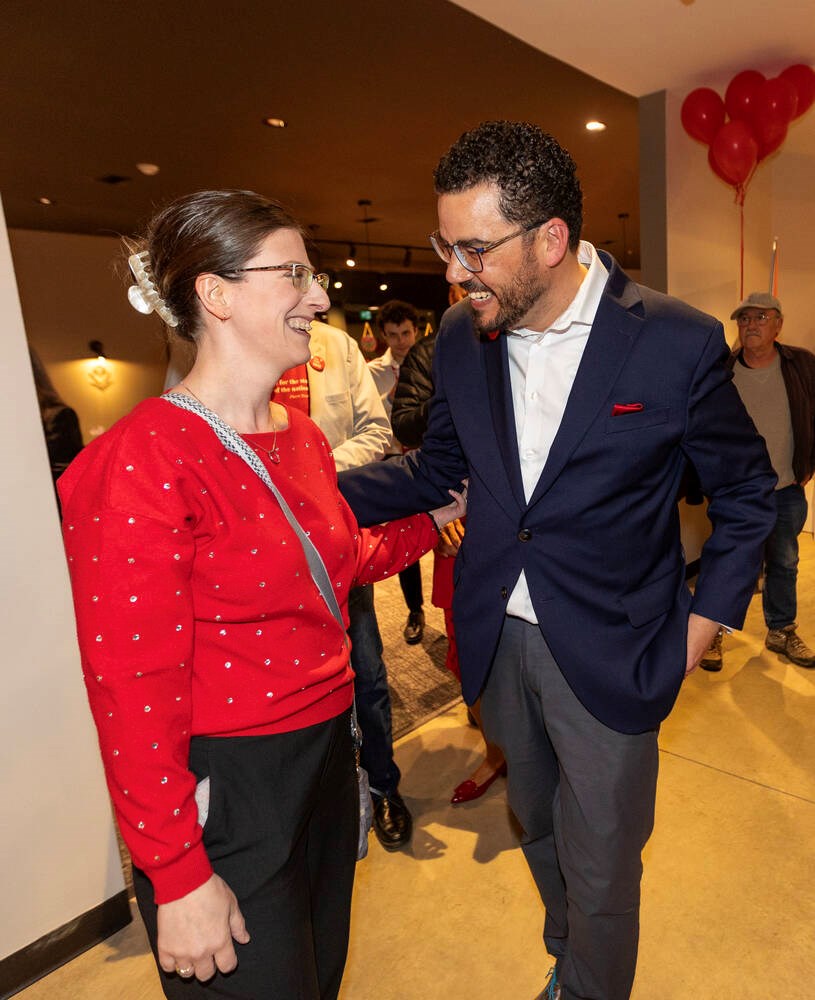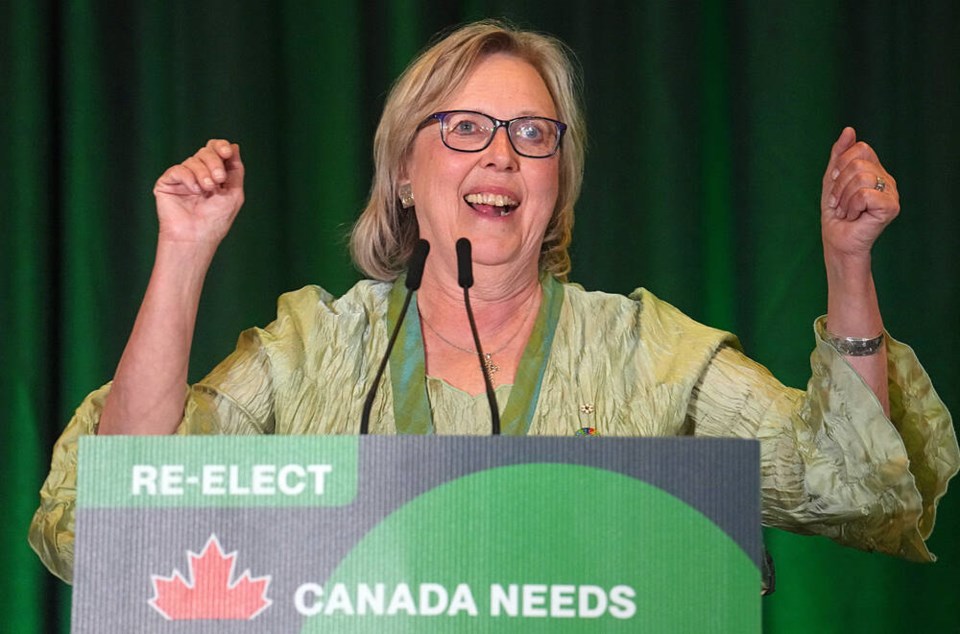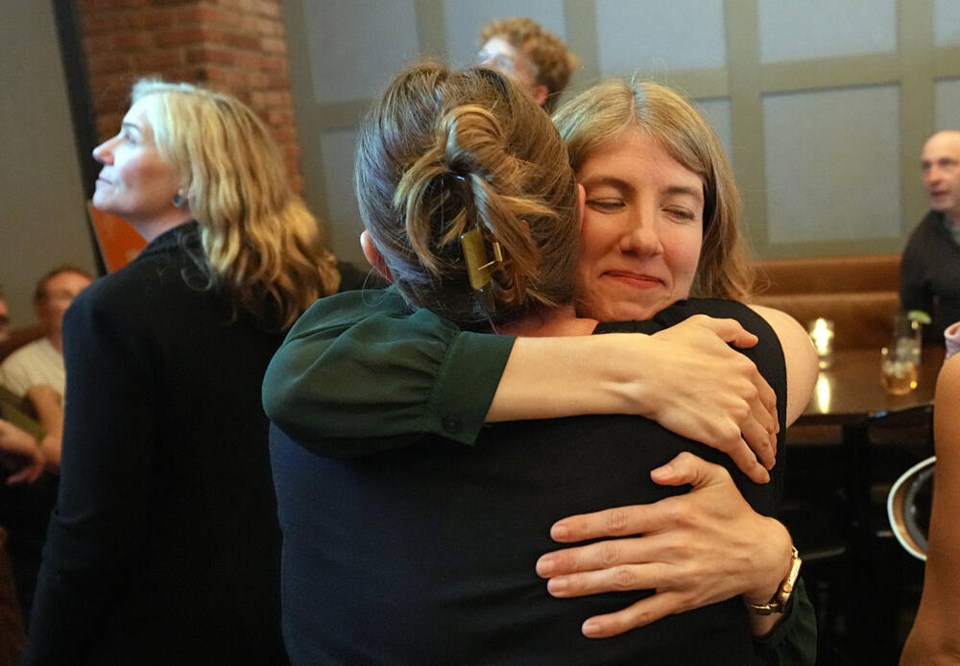Voters on the Island opted Monday night for a “patchwork quilt” of colours, spreading victories in the Island’s seven ridings among four major parties.
With the Liberals projected to form a minority government, early results suggest only one of the ridings — — remains in the hands of the NDP, while three (, , ) flipped to the Conservatives and two appear to have gone Liberal. Green Party co-leader Elizabeth May has held onto her riding.
The Liberal Party’s results on the Island, despite the national surge in popularity, may have been the most surprising. The party has not held a seat on the Island since Keith Martin held Esquimalt-Juan de Fuca in 2011.
The Liberals' dream of reclaiming the two Vancouver Island seats it lost in 2006 and 2011 was realized when Will Greaves defeated the NDP to win and Stephanie McLean stopped the New Democrats’ 14-year streak in .
While voters may have thought the NDP-Liberal races would be nail biters, Liberal Leader Mark Carney’s third visit to Greater Victoria on Sunday night signalled the party was confident in turning the tip of the Island red.
Both David Anderson, who was the Victoria Liberal MP until 2006, and Martin spoke of the importance of capital-region representation in Ottawa.
“When Victoria was in the Liberal government camp was good times for Victoria and it will happen again,” said Anderson, who called Greaves an outstanding candidate.
Martin said the expertise of the two candidates will be of immense value in Carney’s government. “It is outstanding that our Island will have two superb new Liberal MPs in government,” he said.

​Greaves said he’s ready to work hard as part of a Liberal government to deliver on issues that matter — housing, climate change and strengthening Canada’s role in the world.
“I commit to you that I will be a strong voice of Victoria at the table in Ottawa, that I will ensure that our perspectives and our priorities are heard and that we get action,” he said at the Victoria Scottish Community Centre.
Greaves said he hopes that in light of the results “we would see a coming together” and willingness to work with Carney and his team in the next weeks and months.
“I hope that people in Victoria who voted for other parties will give me a fair chance to earn their support and to see me in action before they pass judgment.”
May, who won the Saanich-Gulf Islands seat for the fifth time, told supporters at Church and State Winery Monday night that she will be going back to the House of Commons to work with a prime minister she has known for decades.
May said when she called Carney to congratulate him on forming government, Carney congratulated her on winning her seat, telling her “it will be good to have seasoned, knowledgeable leadership” in parliament.
The Green co-leader said she looks forward to advocating for the environment and to helping Canada deal with “fascists like [U.S. President] Donald Trump.”
She characterized the campaign as hard-fought after media and pundits started questioning if she could win yet another term. “We are here — sorry National Post — [and] we’re not going away,” she said to cheers from the crowd.
Political scientist Michael Prince, the University of Victoria’s acting dean of human and social development, called the Island a “patchwork quilt of political colours. It’s not quite the sweep of the blue wave as we thought.”
Prince said the Island results reflect the importance of the national conversation in a campaign that centred on the trade war with the U.S. and how best to deal with Trump.
Prince said that made the election a two-party race — early results suggested the Liberals pulled 42.9% of the popular vote and the Conservatives 41.7%.
Prince said dealing with Trump and the Conservative focus on the need for change dominated the conversation. “And in a sense, Carney represented some change,” he said.
Prince said May, meanwhile, could have a “disproportionate presence” in Parliament.
“She has tended to do that and right now she is the Grand Dame of the Green movement. The hard question for the party is, this probably is her swan song … hopefully, she’ll be spending that time partly to look seriously at leadership transition and how to rebuild the party.”

The NDP will also have to rebuild. This marks the first time since the 2004 election the NDP have elected just one MP on the Island.
Despite her projected loss to Liberal Will Greaves in the Victoria riding, incumbent Laurel Collins arrived to huge applause from her supporters and chants of “NDP!”
“I’m going to be honest. I am sad that I’m not returning as your member of Parliament,” she told the crowd.
“So many people told me on the doorstep they wanted to vote NDP, but they were too scared. Too scared of Donald Trump, scared of Pierre Poilievre. And so many people said it was just this one time.”
Collins said she wished Canada’s electoral system was “a little bit more sophisticated than forcing people to feel like they need to choose between heads and tails as a country, so we could stand up to a fascist bully while still addressing the huge crises we’re facing as a country.”
NDP campaign volunteer Quinn Deo said he met voters during the last week of the campaign who had already voted in advance polls and apologized for supporting Greaves. They said they voted strategically to prevent a Poilievre government.
Deo, 23, said among young people in Victoria, the choice mostly came down to the NDP’s Collins or Conservative Angus Ross. Those 30 and younger have grown up under Justin Trudeau’s Liberals and have lost faith in the party to address their needs, he said.
— With files from Michael John Lo, Roxanne Egan-Elliott and Cindy E. Harnett

